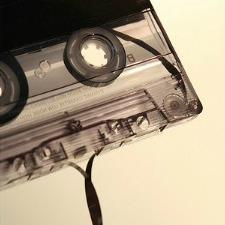BOB GARFIELD: Raw, unedited quotes can be very potent, which is why they make campaigns so nervous. But that power and immediacy is what the podcast Blank-on-Blank is aiming for. Often print journalists record their interviews and then transcribe small portions from the tape for the final piece. Most of it is never heard again. But Blank-on-Blank returns to those interviews and excerpts compelling portions for everyone to hear.
Founder and Executive Producer David Gerlach got the idea while thinking back on his own work as a print journalist.
DAVID GERLACH: There’s all these great asides, outtakes and you never got to use them. Maybe you’d use a few quotes, and as I eventually met more and more journalists, they thought about these interviews that only they got to hear, and I thought that, you know, we could bring these to life.
BOB GARFIELD: Let’s have a listen to what some of these outtakes sound like. This is a fellow by the name of Bono, in an interview with former Rolling Stone writer Anthony Bozza.
[CLIP]:
BONO: What was the question again, just to be sure?
ANTHONY BOZZA: Most, most memorable personal encounter.
BONO: Okay. Well then, with my father as I, I slept beside him in his last weeks and hours.
ANTHONY BOZZA: Mm.
BONO: And his last words, which were “Are you all [BLEEPS/TONE] mad?”
[LAUGHTER]
ANTHONY BOZZA: Are you serious?
BONO: Yeah. [LAUGHS]
ANTHONY BOZZA: Oh, good Lord. [LAUGHING]
[END CLIP]
BOB GARFIELD: You get to hear the reporter’s reaction and get a sense of the dynamics of an interview.
DAVID GERLACH: Exactly. It’s just a different dynamic than whether it’s in a television studio, a recording studio. This was a phone call. I like to say that you're a fly on the wall. We only use things that are on the record. We, obviously, are very respectful of that, and we use things in context. You know, this isn’t TMZ. We’re not looking for “gotcha” moments.
BOB GARFIELD: Let’s hear a bit of tape from Jonathan Alter, now of Bloomberg, then of Newsweek in an interview he had with the newly elected President Barack Obama.
[CLIP]:
PRESIDENT OBAMA: That, that was a big deal because it really set the tenure - the, the tenor for the entire year. And I think it’s fair to say that that helped to create the -you know, the, the Tea Baggers and empowering of that whole wing of the Republican Party.
[END CLIP]
BOB GARFIELD: Whoops, he said “Tea Baggers” [LAUGHS] instead of “Tea Party,” which set off just a whole cascade of opprobrium from Fox News and the political right. That was a “gotcha” moment. When it was in print, you know, it sounds even gotch-i-er.
DAVID GERLACH: With Jonathan, I thought it was interesting to talk about the art of interviewing a president. You know, anything you say during the interview can be used in a political context. One quick note about that interview with the President, you can hear him tapping his finger on the table over and over and over again during different points in the interview.
BOB GARFIELD: Does Blank-on-Blank take advantage of the fact that people are perhaps less on guard, and who would maybe handle things a little differently if he or she were to know that the tape in raw form was going to show up on the Internet?
DAVID GERLACH: Individuals like the President or, you know, rock ‘n roll stars, they know what they’re doing. These are stories they’re willingly telling. We’re not taking anything out of context; we’re not using things that are off the record. So I feel pretty strongly about the fact that the journalist recorded it and there’s nothing different than if they went forward ten years ago and said, oh, I had a great quote from so-and-so, and I used that in a new story.
BOB GARFIELD: So here are Chris Elliott and his father Bob Elliott – Chris Elliott, the comedian and actor, Bob Elliott, the comedian from Bob and Ray from the fifties, sixties and into the seventies.
[CLIP]:
FEMALE CORRESPONDENT: Did you leave your – your job at the office, at the studio or – or would you come home and –
BOB ELLIOTT: Well –
FEMALE CORRESPONDENT: -joke around with each other?
BOB ELLIOTT: Well, we all joked with each other, I think. I think it was a very happy childhood.
CHRIS ELLIOTT: Well, I can remember trying to impress you with, you know, my sense of humor and, and, you know, sometimes succeeding and sometimes failing.
[END CLIP]
BOB GARFIELD: What fascinates me about that is I can hear the difference between these two men speaking to a reporter for a print piece, without any of the performance that goes with a broadcast interview.
DAVID GERLACH: Yeah, it’s father and son sitting back and talking about, you know, their upbringing. I just love what you can hear when it’s just three people talking, versus cameras rolling. There’s something different that I think is really special.
BOB GARFIELD: What’s the difference between print interviewing and broadcast interviewing?
DAVID GERLACH: It’s a different intimacy. You have more time, usually. You know, when we would have interviews at Good Morning America you had four minutes, five minutes to do an interview. When you're sitting down with someone at a – across a table in a café, you’ve got an hour. You can kind of wind into that big question you want to ask or that big story you want to hear about. So I think that’s the biggest difference. You have kind of a comfort level that you can build, really hear things you normally wouldn’t get to hear.
BOB GARFIELD: Well David, thank you so much.
DAVID GERLACH: Thank you.
BOB GARFIELD: David Gerlach is the founder and executive producer of Blank-on-Blank.

